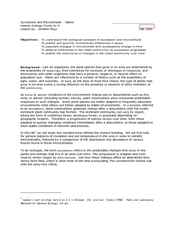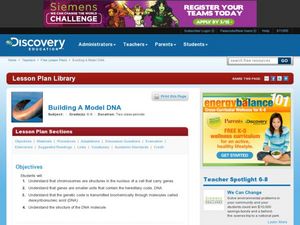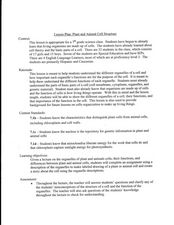Curated OER
Succession and Microclimate
Learners compare the population of insects in different microclimates. In this biology lesson, students collect data using probes to tabulate temperature and soil data. They predict how certain parameters change as an area goes...
Curated OER
Cell Structure and Function
Students compare the organelles present in plant and animal cells. In this biology lesson, students create an analogy to easily remember their assigned organelles. They also research their function and write a creative story.
Curated OER
Plant Reproduction
Students identify the different parts and function of a flower's reproductive system. For this biology lesson, students explain how pollination works. They watch a video and practice labeling parts of both flower and leaf.
Curated OER
Welcome to Populations!
Students define what population is in their own words. In this biology instructional activity, students explain different ways to measure population density. They interpret population graphs.
Curated OER
Movement, it's FUN-damental!
Learners discover how muscles work. In this biology lesson plan, students explain the causes of fatigue and muscle soreness. They create graphs and compare results with their classmate.
Curated OER
Who Stole My Salad?
Eighth graders explain how protein is made in the cell. In this biology lesson, 8th graders translate RNA and DNA using an internet database. They determine the thief based on evidence collected.
Curated OER
Halloween: Arachnids
Students participate in class discussion about the movie Arachnophobia. In this biology lesson, students find articles and photos of a species that interest them. They share it with their group.
Curated OER
H2O in Us
Students discover through this activity that all organisms are composed of water. They find that 70 percent of their bodies are made up of water that is in thier cells and blood, and not free-flowing throughout their body.
Curated OER
Bacteria Change Earth's Atmosphere
Tenth graders organize information to explain how photosynthetic bacteria contributed to climatic changes that happened on Earth. Students create a timeline by using a storyboard to tell the story of the change.
Curated OER
Changing How Things Look
Third graders use a literature study in order to investigate how organisms effect an ecosystem. They are asked questions about change taken from the book. Students also take a nature walk to make field observations.
Curated OER
Genetic Variation
Students study families and their genetics. In this investigative lesson students explain how variations in genetics can be harmful and how some can help with survival.
Curated OER
Light at the Bottom of the Deep, Dark Ocean?
Young scholars participate in an inquiry activity. They relate the structure of an appendage to its function. They describe how a deepwater organism to its environment without bright light.
Curated OER
Data Collection and Record Keeping. Measuring Larval Growth and Development
Students keep data records of the growth of Monarch larvae. The observations are made with the change of each stage of development. The observations are to stimulate the answering of questions about biological development.
Curated OER
Bacterial Transformation Kit
Students participate in an experiment in which they practice moving genes from one organism to another. They examine the results of a recombination of jellyfish. They identify different types of bacteria as well.
Curated OER
Variation in Human Skin Color
High schoolers classify themselves according to the six skin types. In this biology lesson, students explore the causes of human skin variation. They present their findings in class.
Curated OER
Building a Model DNA
Students explain the function of DNA in the body. In this biology lesson, students build a DNA model using simple materials. They demonstrate how bases pair up in the helix.
Curated OER
Inside Story: Your Body, Your Health
Middle schoolers research about different genetic disorders. In this biology lesson, students create a poster highlighting facts about the disorder. They present their findings in class.
Curated OER
Natural Selection in Action
Students demonstrate natural selection through a lab activity. In this biology lesson, students explain how natural selection leads to speciation. They complete their lab report and discuss results in class.
Curated OER
Plant and Animal Cell Structure
Seventh graders identify the different parts and functions of the cell. In this biology lesson, 7th graders make a labelled diagram of either a plant or animal cell. They write a story about it.
Curated OER
Characteristics of Living Things
Seventh graders identify the characteristics of living and non-living things. In this biology lesson, 7th graders define vocabulary words as they go through the lesson. They answer a crossword puzzle after class discussion.
Curated OER
Photosynthesis and Respiration
Eighth graders differentiate photosynthesis and respiration. In this biology lesson, 8th graders draw a diagram explaining these two processes. They answer a quiz after the lesson.
Curated OER
Terrariums for Project Pals
Students identify the components needed by plants to survive in the terrarium. In this biology instructional activity, students build their own terrariums using materials available. They present their project in class.
Curated OER
Nudibranchs-Splendid Sea Slugs
Students brainstorm a list of colorful animals and research why they are colorful. In this biology lesson, students sketch what a nudibranchs look like before watching a video. They compare their sketch to the actual...
Curated OER
Eeks Beaks
Seventh graders examine the concept of adaptations that take place in the wild. Birds are the focus organism for this study. They examine the beaks of different birds and point out the differentiations.























